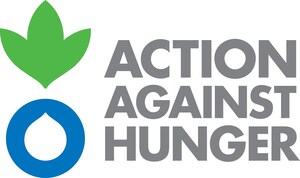NEW YORK, Sept. 15, 2017 /PRNewswire-USNewswire/-- According to a new report issued by the Food and Agriculture Organization of the United Nations (FAO), the number of hungry people in the world increased to from 777 million in 2015 to 815 million in 2016. The international humanitarian organization Action Against Hunger issued a statement today in response to the report, stressing that this rise in world hunger cannot be understood without recognizing—and addressing—the links between conflict, climate, and food insecurity.
In 2015, the number of people suffering from hunger around the world dropped below 800 million, despite population growth—an historic achievement. In September of 2016, world leaders and the international community convened at the United Nations to commit to a bold new Agenda for Sustainable Development, which includes the ambitious goal of ending hunger by 2030. However, data in the new UN hunger report signals an alarming reversal in momentum. Action against Hunger warns that without urgent action, the fight against hunger could be at risk of failing.
Sub-Saharan Africa hit hard
The trajectory of hunger is rising and Sub-Saharan Africa and Southeast Asia are the most affected. The prevalence of hunger remains highest in sub-Saharan Africa, where it increased from 20 percent in 2013 to 22.6 percent in 2016. Of greatest concern is East Africa, where one third of the population is suffering from hunger.
In March of 2017, the United Nations warned that 20 million people were at risk of starvation, with an official famine declaration in parts of South Sudan, and looming famine across Nigeria, Somalia, much of South Sudan, and Yemen, constituting the worst humanitarian crisis the UN had faced since it was founded in 1945—and the first time since 2011 that famine has been officially declared anywhere on the planet. The international community cannot ignore these indications of a possible reversal in progress to eradicate hunger.
The impact of conflict and climate
Conflict in all four countries —Somalia, South Sudan, Nigeria and Yemen—compounded by drought in the case of Somalia, has created a hunger crisis of monumental proportions. In many places in these countries, insecurity prevents aid delivery, as is the case in many situations of armed conflict.
Violence prevents the safe, unimpeded delivery of aid to populations in crisis. People are displaced from their homes and forced to abandon their assets, livelihoods, crops, and land, leaving them without a safety net. Action Against Hunger emphasizes that a concerted political effort is urgently required to end these crises and allow for the delivery of food assistance and other help.
Climate change is also driving hunger among the poorest communities and undermining current efforts to combat hunger. The new UN hunger report mentions the impact of the El Niño weather phenomenon, which has caused severe drought in Southern Africa, East Africa, and Southeast Asia, as well as heavy rains and massive floods in India, Kenya, and South America. Extreme weather such as drought kills crops and livestock, destroying livelihoods and sources of food for the most vulnerable small-scale farmers and pastoralist communities. On average, eight out of ten people in the four countries threatened by famine live in rural areas; supporting their livelihoods is their best defense against famine.
Hunger must become an urgent international political priority
Action Against Hunger emphasizes that that there are multiple, major drivers of hunger threatening progress, including: poverty, inequality, conflict and displacement, climate change, inadequate agricultural policies, and poor governance and weak infrastructure. Without a multidimensional approach, hunger will persist.
In order to achieve the ambitious goal of ending hunger by 2030, the international community must exert stronger political will and mobilize more resources.
The number of people suffering from hunger in the world is rising not only because of the upsurge in conflicts, but also—and above all else—because hunger is not a global political priority.
It is possible to end hunger. To succeed, Action Against Hunger urges:
- Both States and the international community to exert political pressure to end crises, avert famine, and break the vicious circle between hunger and conflict;
- Respect, promote and fulfill human rights and women and children rights in particular;
- Donors and governments from developing countries to increase both their humanitarian and long-term funding to strengthen response capacity to famine crises, and reduce the vulnerability of at risk-groups to famine and undernutrition by supporting small-scale farming in the long term and supporting climate change mitigation and adaptation strategies;
- Donors and high burden countries should also ensure that (1) a focus on nutrition is retained in humanitarian crises, and that the financial needs associated with ensuring adequate nutrition for women, children, and adolescents in emergencies are adequately addressed in government systems; (2) longer-term sustainable plans and nutrition strategies that will last beyond the emergency phase are defined.
Unless such actions are taken, hard-won collective efforts to end hunger are in danger of unravelling. The figures from the 2017 State of Food Insecurity Report must be a wake-up call to spur the international community to take greater, more effective action against hunger and food insecurity around the globe.
SOURCE Action Against Hunger
WANT YOUR COMPANY'S NEWS FEATURED ON PRNEWSWIRE.COM?
Newsrooms &
Influencers
Digital Media
Outlets
Journalists
Opted In





Share this article